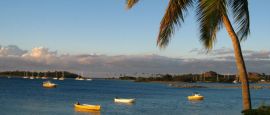Fiji Weather, climate and geography
Weather & climate
Fiji has a warm tropical climate perfect for beachside holidays. Maximum temperatures rarely move out of the 31°C (88°F) to 26°C (79°F) range all year round. Southeast trade winds from May to October bring dry weather and the rainy season runs from November to April. On average, there are 17 cyclones per decade with some causing severe damage. They typically occur from November to April but occasionally occur in October and May during El Niño years. There is more risk in the outlying northwest island groups.
Fiji does have a wet season, which is characterised by heavy, brief local showers and contributes most of the country’s annual rainfall. The wet season is normally from November to April and results from the southerly movements of the South Pacific Convergence Zone. This is an excellent period for surfing, as tropical storms can bring some superb waves and shorter swells. It can, however, also bring strong winds and heavy tropical rain. Typically, the smaller islands in Fiji receive less rainfall than the main island with various amounts according to their location and size.
The best months for holidaying regarding Fiji weather is late May through to early October. Note that this period is also the peak season for tourists.
Geography
Fiji is located in the South Pacific, over 3,000km (1,875 miles) east of Australia. It comprises 333 islands, 110 of which are inhabited (as well as over 500 islets). The three largest are Viti Levu (Great Fiji), Vanua Levu (Great Land of the People), both of which are extinct volcanoes rising abruptly from the sea, and Taveuni. There are thousands of streams and small rivers in Fiji, the longest being the Rewa River on Viti Levu, which is navigable for 128km (80 miles). Mt Tomanivi, also on Viti Levu, is the country's highest peak, at 1,324m (4,343ft).
Do you have any Feedback about this page?
© 2026 Columbus Travel Media Ltd. All rights reserved. No part of this site may be reproduced without our written permission, click here for information on Columbus Content Solutions.




 You know where
You know where